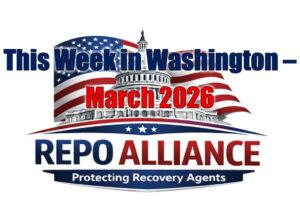We wanted to share the latest news regarding the Debt Limit talks, which could have major implications to the auto industry.
ARA’S lobbyists Van Scoyoc is working around the clock and through the weekend, to watch our back. Holiday weekends present prime targets and vulnerability to our industry and many other stakeholders. This is when bills get amended, gutted, amended, as well as passed, when people are not paying attention.
The good news is that negotiators from both sides have made progress in the last 24 hours. Negotiators will continue their work throughout the holiday weekend, and both chambers of Congress are prepared to bring members back to pass the agreement. Though nothing is agreed to until everything is agreed to—as the old negotiating mantra goes—the talks are centered on the following topics:
- Increase the debt limit until after the 2024 elections.
- Two-year spending freeze, though we don’t know at what level.
- Rescission of unobligated COVID funds.
- Some energy permitting reforms.
The bad news is that rank-and-file members of Congress—from both parties—are unhappy with what they are hearing. Republicans went to the floor demanding that Speaker Kevin McCarthy hold the line and insist on their previously passed Limit, Save, Grow Act.
They do not accept any concessions from that bill. In fact, the House Freedom Caucus sent a letter urging the negotiations to include border security legislation and other topics not in the original LSG Act. And in the Senate, Senator Mike Lee (R-UT) has pledged to use every parliamentary tool available to block the debt limit bill’s passage.
And Democrats are also unhappy. House Democrats had a conference call with White House debt limit negotiators last night. Lawmakers expressed their opposition to such large cuts and work requirements on important programs (particularly Medicaid).
Democrats told the White House not to expect them to vote in large numbers in favor of the deal. They demanded the White House get McCarthy to pledge a certain level of Republican votes. And then House Democrats may be able to provide only 80-100 votes (out of 213).
Overall, the same dynamic at play for weeks has only intensified: if negotiators can reach the elusive deal, there is not strong confidence it can pass both chambers of Congress. After all, it has been many years since split chambers of Congress have required both parties to bring large numbers of votes to the passage of a must-pass bill of this magnitude. And since that time, the newer members of Congress have a very different outlook on how government and Congress should operate. We will continue to keep you posted.
Stay tuned!
American Recovery Association (ARA) on behalf of Repo Alliance













More Stories
Repo Alliance – This Week in Washington – March 2026
Royal Key Supply Announces Kevin Zwahlen as Account Executive – Repossession Sector
CALR Meets with State Repossession Regulators
Powering Smarter Recoveries, Vendor Safety and Faster Workflows
Take the Survey: Tell RDN What Recovery Pros Need Most
One Year Later: How Real-Time Communication Is Keeping Recovery Agents Safer